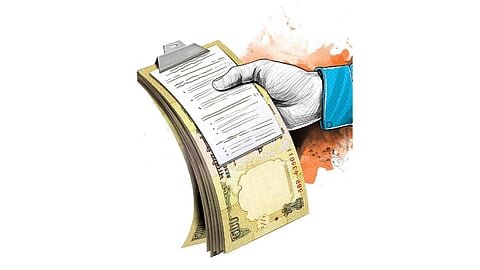Margao: A widening job-recruitment scandal in Goa intensified on Friday after the prime accused, Pooja Naik, publicly named senior officials and a state minister she alleged were involved in a cash-for-jobs racket that stretched across years and spanned hundreds of applicants. Her claims, made alongside an opposition leader, have triggered demands for a judicial inquiry and renewed questions about the conduct of local police.
Accused Steps Forward With New Allegations
The state’s long-running cash-for-government-jobs scandal took a dramatic turn on Friday when Pooja Naik, the prime accused in multiple recruitment-fraud cases, emerged before reporters and accused three high-ranking figures of orchestrating and benefiting from the scheme.
Standing beside state Aam Aadmi Party (AAP) president Amit Palekar, Naik identified power minister Ramkrishna “Sudin” Dhavalikar of the Maharashtrawadi Gomantak Party (MGP), an IAS officer, and a senior Public Works Department engineer as central actors in the operation.
Naik, who faces charges in five related cases, sketched a narrative that stretched back more than a decade to her time working at the MGP party office. Even then, she claimed, government jobs were routinely exchanged for cash.
A Recruitment Boom and a Surge in Payments
According to Naik, the scam ballooned during the 2019 “mega recruitment drive,” when nearly 10,000 government positions were advertised. She said Dhavalikar instructed her to coordinate directly with the IAS officer and the PWD engineer to collect payments from job aspirants.
“I collected ₹17.7 crore from 613 job seekers and delivered the funds to these two officials at a Porvorim apartment,” she told reporters. “They would openly accept the money from me.”
Naik added that she was part of a nine-member team that handled collections from applicants — all of whom, she said, had already been arrested in earlier phases of the investigation. She claimed she had urged her associates to join her in publicly disclosing the scheme, but they refused.
Police Pressure, Missing Videos, and a Growing Political Rift
Naik alleged that she faced excessive pressure during police interrogations at the crime branch and was prompted by a Deputy Superintendent of Police to provide particular statements. She claimed that she possessed two video recordings stored on her mobile phone that could support her allegations. However, she said the device was seized at the Bicholim police station, transferred to the Mardol station, and never returned.
Despite naming three senior individuals, Naik stated that Chief Minister Pramod Sawant had no involvement in her dealings. Palekar, speaking after Naik’s disclosures, demanded that her statement be recorded before a magistrate and called for an immediate judicial inquiry. He also urged the suspension of the North Goa Superintendent of Police and the DySP involved, and sought the minister’s removal pending investigation.
Police Counterclaims and the Unresolved Questions Ahead
The allegations emerged just one day after North Goa Superintendent of Police Rahul Gupta told reporters that investigators had been unable to corroborate Naik’s earlier claims — including purported cash transfers at a Porvorim location. Gupta also noted that although Naik had named a politician, she had not directly accused him in her formal statement.
The disconnect between Naik’s public disclosures and the police’s findings has widened political tensions in the state, even as investigators continue to sift through witness accounts, financial trails and seized devices.
With competing narratives now in the open — one from an accused who claims she acted under the direction of senior officials, and another from police who say they have found no such evidence so far — the scandal appears poised to enter a more contentious and public phase.



